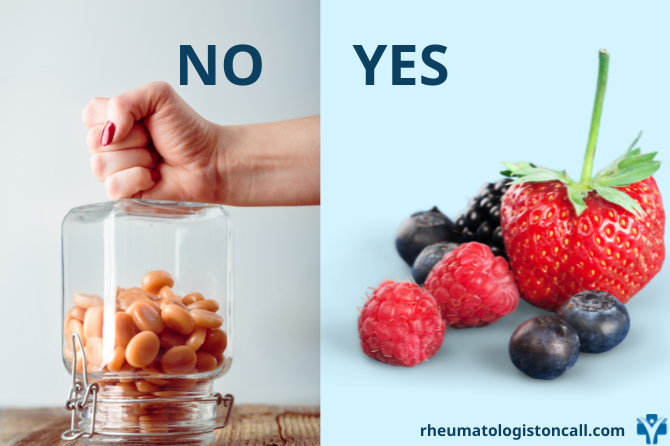SHARE
In this article we discuss five tips that will help you decrease inflammation. If you are suffering from an autoimmune diseases or inflammatory arthritis you should review these tips and start implementing promptly.
Yes, the food that we eat influences our health and mood!
What is science saying?
Research shows there is a direct correlation between increased weight/ obesity and worsening inflammation.
Yes, your weight affects joint pain!
Often, my patients are interested to learn about dietary changes. Food is medicine. Food can help decrease inflammation, prevent the onset or, if already diagnosed, further progression of autoimmune diseases or inflammatory arthritis. Proper food changes will improve your life quality. Many specialists/nutritionists are blogging these days about the benefits of different types of diets or supplements.
What are the five tips that we recommend?
Let’s review 5 TIPs that will help you improve your health and decrease the inflammation in your body:
1.Stop Eating Sugar

Many studies linked the excess of sugar to increased levels of inflammation, increased gut permeability, and insulin resistance. First, please take a look at the foods you buy as you will find excessive amounts of sugar in most foods you buy from the shelves. Second, be aware that soda, bread, sweets, ham, yogurt, or cereals are just a few things that contain massive amounts of sugars.
2.Reduce consumption of red meat and poultry
The idea that you can get enough protein consuming meat is way overdue, and it was again and again proven to be wrong. Why? Excessive amounts of meat were actually linked to cancers. Therefore, if you choose to eat red meat, select grass-fed beef or lamb rather than conventionally produced beef.
3.Eat more fish
YES, eat wild-caught fish at least 2-4 times/ week. Wild-caught salmon and sardines are recommended. They are excellent sources of omega-3 fatty acids.
4. Veggies, legumes, and fruits
If possible, eat them fresh or just a little prepared terminally. Try not to boil them, instead bake or grill them. In addition, eat many fruits: berries, cherries, pomegranates, mango, papaya, grapes.
5. Eat more nuts and seeds
Nuts (especially walnuts, pecans, Brazilian nuts) are excellent sources of healthy fats. Add hemp seeds of grounded flax seeds to your salads.
Look for changes that you can make for a long-term journey. Our doctor is here to give more information about things that you can change slowly but scientifically proven to help you feel better.
About the author
Diana Girnita, MD, PhD is an US board certified internal medicine and rheumatology. She completed a PhD in immunology, postdoctoral fellowship at Harvard University, immunology fellowship at University of Pittsburgh and rheumatology fellowship at University of Cincinnati. She is the founder&CEO of Rheumatologist OnCall, a telemedicine company that serves multiple states in the US. She is an assistant professor in the department of Rheumatology at University of Cincinnati. Dr. Girnita is a graduate of the Nutrition Science course from Stanford University. Dr. Girnita was recognized many times with “Top Doctor” award (2017-2020) and is frequently invited speaker of the US National Arthritis Foundation. Read more















